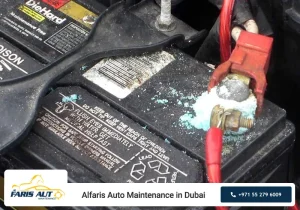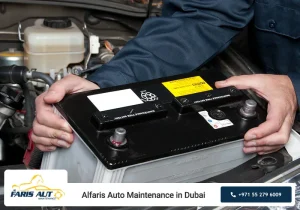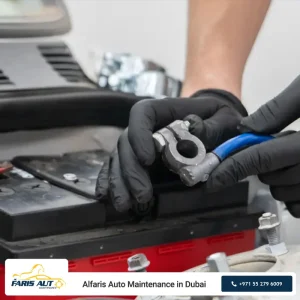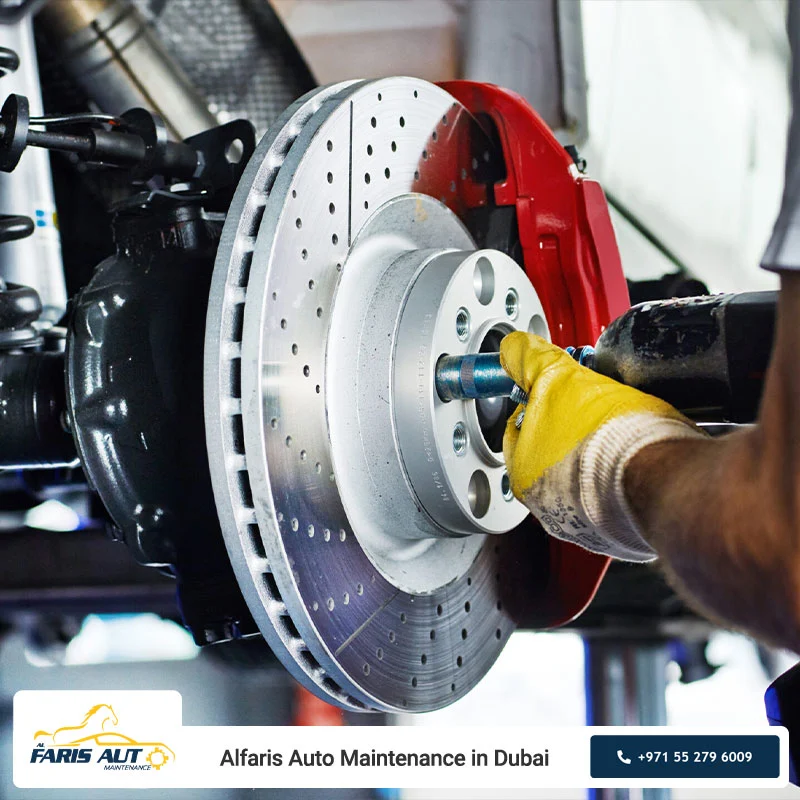Battery failure in heat is a common issue faced by drivers in tropical and desert regions such as Dubai and other high-temperature areas. Sudden battery failure in hot weather can cause a vehicle to stop unexpectedly under inconvenient conditions, leading not only to repair and replacement costs but also safety hazards. In these regions, the air temperature rises continuously and intensely, directly affecting the performance and lifespan of car batteries. The car battery, as the heart of the vehicle’s electrical system, plays a vital role in starting the engine and supplying power to various systems.
In this article, Alfars Auto will thoroughly examine the causes of battery failure in heat, warning signs, prevention and maintenance methods for batteries in hot weather, and immediate solutions when facing battery failure. Additionally, specialized tips for selecting suitable batteries for hot climates and the costs of battery replacement in summer will be provided, enabling drivers to fully understand how to prevent battery failure in hot weather and make the best decisions if problems arise. By better understanding the effects of heat on car batteries and following maintenance tips, battery life can be extended, and extra expenses avoided. The following sections comprehensively address these topics to offer a complete guide for all vehicle owners in hot regions.
- How Heat Affects Car Batteries
- Common Causes of Battery Failure in Heat
- Warning Signs of Battery Failure in Heat
- Maintenance Checklist to Prevent battery failure in hot weather
- What to Do If Your Battery Fails in Heat
- Choosing the Right Battery for Hot Climates
- Summary of Battery Maintenance in Heat and Repair
How Heat Affects Car Batteries

High temperatures are one of the main factors that reduce the lifespan and cause failure of car batteries. In lead-acid batteries, the internal chemical reactions that generate energy are highly influenced by temperature. As the temperature rises, the rate of chemical reactions increases, accelerating the corrosion of the lead plates inside the battery. Moreover, intense heat causes the electrolyte fluid (a solution of acid and water) to evaporate, lowering the electrolyte level, which disrupts battery performance and reduces its energy storage capacity—ultimately leading to battery failure in heat.
On the other hand, excessive heat increases the internal pressure of the battery, which may cause it to swell or even burst. These processes gradually reduce the battery’s useful life and significantly increase the likelihood of sudden battery failure in hot conditions. In other words, the impact of heat on battery life is serious and can cause the battery to require replacement earlier than expected. For drivers in hot regions, understanding these scientific and practical effects is crucial to maintaining the battery in hot weather, preventing sudden failures, and reducing extra costs. Alfars Auto, with extensive experience in car repair services in Dubai including electrical systems of various vehicles, is ready to assist drivers.
Common Causes of Battery Failure in Heat
As mentioned, excessive heat causes battery failure for several reasons, which we briefly explained and will now discuss in more detail:
- Evaporation and Reduction of Electrolyte Level: In hot weather, the electrolyte fluid inside the battery evaporates quickly, reducing its level. This causes the lead plates to have less contact with the electrolyte, decreasing the chemical reaction. The result is reduced battery capacity and eventual failure.
- Increased Corrosion Rate of Terminals and Connections: Heat accelerates corrosion on battery terminals and connections. Corrosion increases electrical resistance and reduces current flow, leading to weak engine starts. For instance, in vehicles where battery terminals are not regularly cleaned, this corrosion worsens during summer, causing faster battery failure.
- Additional Electrical Loads on the Battery: In hot weather, the use of air conditioning systems, audio systems, and lighting increases, putting extra strain on the battery. This additional load causes the battery to drain faster and, if not properly charged, results in damage. For example, drivers who keep the air conditioning running while the car is parked on hot days are more likely to experience sudden battery failure.
- Overcharging and Charging System Malfunctions: Heat can cause faults in the vehicle’s charging system (alternator), leading to overcharging of the battery. Overcharging raises the internal battery temperature and accelerates electrolyte evaporation, causing severe damage. For example, vehicles with improperly regulated charging systems commonly suffer battery failure in heat due to overcharging.
- Low Quality or End-of-Life Batteries: Using low-quality batteries or those that have reached the end of their lifespan results in faster failure in hot weather. Low-quality batteries have poor heat resistance and deteriorate quickly.
- Prolonged Exposure to Direct Sunlight: Parking the vehicle under direct sunlight increases battery temperature, which accelerates electrolyte evaporation and internal pressure buildup.
Warning Signs of Battery Failure in Heat

After understanding the causes, it is important to recognize the warning signs of battery failure in Heat to prevent severe damage and high costs:
- Weak or Slow Engine Start: When the battery weakens, the engine struggles to start or the starter motor sounds slow and weak.
- Battery Warning Light on the Dashboard: Illumination of the battery or electrical system warning light indicates a problem with the battery or charging system.
- Battery Swelling or Leakage: Swelling of the battery casing or electrolyte leakage signals serious failure.
- Sulfur or Unpleasant Odor: The smell of rotten eggs or sulfur from the battery indicates internal gas leakage and damage.
- Corroded/Rusted Cables or Terminals: Corrosion and rust on terminals reduce electrical transfer and cause battery failure.
- Shortened Battery Lifespan: If the battery fails earlier than expected, it is a warning sign.
Recognizing these signs helps drivers take necessary actions before sudden battery failure occurs, preventing unexpected vehicle stoppages. Alfars Auto is the best choice for electrical system repair and car electronics services in Dubai.
Maintenance Checklist to Prevent battery failure in hot weather
After reviewing the signs and causes, it is time to examine the preventive measures for battery failure in heat:
- Check Electrolyte Level and Add Distilled Water: Monthly check the electrolyte level and add distilled water if it has dropped. This prevents evaporation and damage to lead plates.
- Keep Battery Terminals Clean and Use Anti-Corrosion Protectors: Clean terminals with a wire brush and apply anti-corrosion sprays to reduce corrosion.
- Inspect Charging System and Alternator: Regularly check the vehicle’s charging system to avoid overcharging or undercharging the battery.
- Reduce Unnecessary Electrical Loads During Long Parking: Turn off non-essential electrical systems such as audio and lights when parking for extended periods.
- Park in Shade and Use Sunshades: Park the car in shaded areas and use sunshades when possible to lower the temperature inside the engine bay and battery.
- Replace Old Batteries Before End of Life: Change old batteries before complete failure to avoid sudden breakdowns.
- Choose Batteries with High Heat Resistance: When purchasing, select models designed for hot climates.
Vehicle owners in hot regions are advised to check their car batteries at least once a month to prevent heat-related battery failure. Regular vehicle servicing is also essential for car care. For information about periodic car maintenance costs, you can contact Alfars Auto.

Contact with AlFaris
You can contact our experts for free consultation, discuss the type of problem or service you are requesting, and arrange for your presence.
What to Do If Your Battery Fails in Heat
When you encounter battery failure in heat, first carefully check the dashboard lights, engine start sound, and the area around the battery for any leaks or swelling. In case the battery is discharged, you can try jump-starting the vehicle using jumper cables or roadside assistance services. Should you notice any leakage or swelling, it is best to immediately contact a specialist or mechanic to properly diagnose the issue. Then, take the battery to a repair shop for thorough testing, recharging, or replacement. Also, always follow safety precautions when handling batteries: wear gloves and protective glasses and avoid inhaling battery fumes. By following these steps, you can quickly resolve battery failure in hot weather and prevent further damage to your vehicle.
Choosing the Right Battery for Hot Climates
To select the best batteries with good heat resistance, several important criteria should be considered. Cold Cranking Amps (CCA), the material of internal plates, valid warranty, and reputable brands are key factors when choosing a battery suitable for hot climates. AGM (Absorbent Glass Mat) and EFB (Enhanced Flooded Battery) types offer better resistance to high temperatures and longer life in hot weather conditions compared to conventional batteries.
Before purchasing, carefully read the manufacturer’s technical specifications and consult with the seller or expert to choose the best option for extreme heat conditions. Selecting the right battery not only extends battery life but also significantly reduces the chance of failure during hot summers. If you live in hot cities like Dubai, you can also read the article on the best cars for hot climates for more information.
Summary of Battery Maintenance in Heat and Repair

The cost of battery replacement in hot regions like Dubai varies depending on the vehicle type and battery brand. High-quality, eputable brand batteries are more expensive but provide longer life. Besides the battery cost, additional expenses such as terminal replacement, charging system tests, and roadside assistance may apply. The key point is to use better quality batteries to prevent heat-related failures. Battery replacement usually takes between 30 minutes to one hour, but in emergencies, roadside assistance can replace the battery on-site. Drivers are advised to inquire about battery replacement costs in Dubai and similar areas from reliable centers to ensure service quality. Alfars Auto is one of the best centers offering free consultation and car battery repair services. For contact, you can call +971552796009.
Battery failure in heat is a common problem in hot regions caused by electrolyte evaporation, terminal corrosion, extra electrical loads, and low-quality batteries. Recognizing warning signs such as weak starts, battery swelling, and unpleasant odors helps drivers take timely action before complete failure. Proper battery maintenance in hot weather—including checking electrolyte levels, keeping terminals clean, parking in shade, and choosing suitable batteries—extends battery life and reduces extra costs. In case of battery failure in hot weather, immediate actions such as jump-starting and contacting a mechanic are essential. Check your car battery today; for quick inspection and free testing, contact Alfars Auto service center in Dubai and prevent battery failure.




